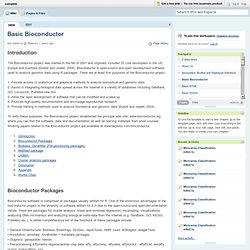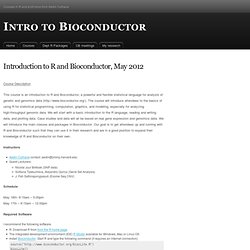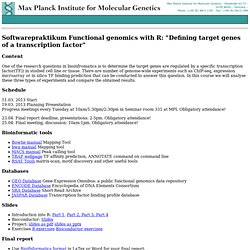

Compbio / Basic Bioconductor. The Bioconductor project was started in the fall of 2001 and originally included 25 core developers in the US, Europe and Australia (Dudoit and Jewell, 2004).

Bioconductor is open-source and open development software used to analyze genomic data using R packages. There are at least five purposes of the Bioconductor project: 1. Provide access to statistical and graphical methods to analyze biomedical and genomic data 2. 3. 4. 5. To unify these purposes, the Bioconductor project established the principal web site, www.bioconductor.org where you can find the software, data and documentation as well as training materials from short courses. Bioconductor software is comprised of packages usually written for R. . • General infrastructure: Biobase, Biostrings, DynDoc, reposTools, rhdf5 ,ruuid, tkWidgets, widgetTools. • Annotation: annotate, AnnBuilder + metadata packages. • Graphics: geneplotter, hexbin. • Other assays: aCGH, DNAcopy, prada, PROcess, RSNPer, SAGElyzer. • classPP: projection pursuit.
CCCB Introduction to R and Bioconductor, Dec 2012. Course Description This course is an introduction to R and Bioconductor, a powerful and flexible statistical language for analysis of genetic and genomics data ( The course will introduce attendees to the basics of using R for statistical programming, computation, graphics, and modeling, especially for analyzing high-throughput genomic data.

We will start with a basic introduction to the R language, reading and writing data, and plotting data. Case studies and data will all be based on real gene expression and genomics data. We will introduce the main classes and packages in Bioconductor. Our goal is to get attendees up and running with R and Bioconductor such that they can use it in their research and are in a good position to expand their knowledge of R and Bioconductor on their own. Instructors Aedin Culhane contact: aedin@jimmy.harvard.edu Guest Lecturers: Nicolai Juul Birkbak (SNP data) Svitlana Tyekucheva, Alejandro Quiroz (Gene Set Analysis) J. Schedule Required Software Agenda. High-throughput data analysis using R and bioConductor. Class Information Course title: High-throughput data analysis using R and bioConductor Instructor: Hao Wu. Email: hao.wu at emory dot edu.
TA: Shuo Chen. Email: schen33 at emory dot edu. Softwaremanagement im Softwarebereich. Content One of the research questions in bioinfromatics is to determine the target genes are regulated by a specific transcription factor(TF)) in studied cell line or tissue.

There are number of genome-wide experiments such as ChIP-seq, expression microarray or in silico TF binding prediction that can be conducted to answer this question. In this course we will analyse these three types of experiments and compare the obtained results. Schedule 11.03. 2013 Start 19.03. 2013 Planning Presentation Progress meetings every Tuesday at 10am/1:30pm/2:30pm in Seminar room 331 at MPI. 23.04. Bioinformatic tools Bowtie manual Mapping Toolbwa manual Mapping toolMACS manual Peak calling toolTRAP webpage TF affinity prediction, ANNOTATE command on command lineRSAT Tools matrix-scan, motif discovery and other useful tools Databases Slides Final report Use Bioifnformatics format in LaTex or Word for your final report.
Presentation Software Submission Details Web tools Comments Permissions. Systems Biology Verification. TranSMART project.
PolySearch. HEFalMp. NCBO BioPortal. Clinical & Translational Science Awards. Translational Research - NIH Overview. ENFIN FP6 project. Entelos. Data mining, forecasting and bioinformatics competitions on Kaggle.